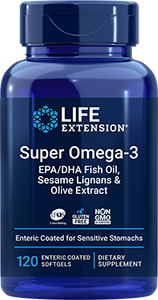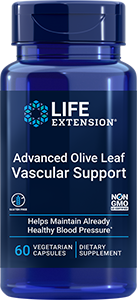
Is Olive Oil Good for You?
Published: May 2024
For decades, scary headlines and shaky research had us believing that fats are bad for our health, creating confusion about their impact on our well-being. Many still worry that consuming them will infringe on our waistline, cholesterol levels and overall heart health.
But we have good news! Science has told us that our bodies want healthy fats. It's one of the reasons why the Mediterranean diet stands out: it encourages the consumption of heart-friendly foods, and olive oil is at the heart of this cardiovascular-friendly diet.
So, what's behind the health benefits of olive oil? It boils down to its polyphenol content, aka the active compounds in the fruits and leaves of the olive tree. Let's explore the heart-healthy benefits of olive oil, and specifically, how it can support already-healthy blood pressure and circulation.
Can olive oil support healthy blood pressure?
It sure can! But the effect will depend on its content of active compounds, so not all olive oils will be equally effective. In fact, for best results, you might want to go beyond your everyday kitchen EVOO and consider adding a supplement. Studies show that olive leaf extract (which contains high concentrations of the beneficial polyphenols in olives) can support healthy blood pressure, both systolic and diastolic. It can also help maintain a healthy lipid profile.
Other research echoes these findings, noting that in both preclinical and clinical studies, olive oil has demonstrated the ability to help maintain healthy blood pressure. Research suggests that this happens due to the high oleic acid and antioxidant polyphenol content of olive oil. Oleic acid is a mono-unsaturated, omega-9 fatty acid, and polyphenols are antioxidants that can help protect the body's tissues from oxidative stress.
Does olive oil promote healthy blood circulation?
Again, the answer is yes! Olive oil might encourage endothelial function (the delicate inner lining of arteries and blood vessels), which can help maintain healthy blood circulation. Studies have shown that adding olive oil as part of a cardiovascular-friendly diet (thank you, polyphenols!) can also help.
Your nutrition can support a healthy inflammatory response, which creates a ripple effect of wonderful health benefits, including cardiovascular well-being.
How much olive oil should you have each day?
Now that you understand the benefits of olive oil (and its polyphenol content in particular), should you put a straw in a bottle of olive oil and drink up? Not quite: as with anything we eat, consuming healthy fats in moderation is key.
So what's an appropriate serving size for olive oil? Clinical research tells us that having an intake somewhere between seven and 20 grams (or roughly .5 to 1.5 tablespoons) of olive oil a day can support cardiovascular health and even promote a healthy lifespan.
If this sounds like a lot, fear not! It's easy to sneak olive oil into your nutrition. Drizzle it over your salad, use it in baking goods, or even add it to your smoothie or coffee (Starbucks did it!).
If you need more inspiration, we've got all sorts of olive oil recipes.
Is it okay to have olive oil every day?
Indeed, it is! But again, be mindful of portions and also choose extra virgin olive oil when possible. Speaking of which…
What is the difference between olive oil, virgin olive oil and extra virgin olive oil?
You may have heard the terms "virgin" olive oil and "extra virgin" olive oil, or EVOO. Are these the same, and are they any different from plain olive oil? Indeed, there is a difference. It comes down to how they're made: cold-pressed or processed.
Cold-pressed
: This extraction method involves grinding, squeezing and rotating the crop to separate the oil from the fibrous parts of the plant. It does not use heat, chemicals or preservatives; the end result is pure oil.Processed
: When an oil is processed or refined, it means the oil was extracted by applying extreme heat, chemicals and often preservatives to increase the oil's shelf life and smoke point.
Olive oil is a blend of cold-pressed and processed oils, and this extraction method might also take away some of the good things that you want to keep in there. (Although, the shelf life will be impressive!) Virgin olive oil (VOO) is a little less processed and will have more of the good stuff (hello, polyphenols). And finally, EVOO is made entirely from cold-pressed extraction processes, so you're getting the good stuff!
So, when possible, choose EVOO. But if you can't find it at your local grocery store, then choose virgin olive oil. And if regular olive oil is your only option, fret not. It still has monounsaturated fatty acids (the good kind of fats our bodies need), which can be great for your health.
Pro tip: How an oil is made isn't the only consideration. There are other variables that can affect the contents of your olive oil. For example, the types of olives used, the amount of time they grew on the tree, and how long they sat around before being pressed can all have an impact. This is why different brands of oil have different tastes, consistencies and flavors.
Are Fats Good for Heart Health?
How is it possible that olive oil, a pure fat, be beneficial for heart health? Fats, or lipids, are not all "bad": in fact, they are chemical compounds that your body needs for multiple functions, including building cell walls and transporting and storing energy. For example, cholesterol is a lipid in your blood that the body uses to make hormones like pregnenolone, the mother of all hormones. So, without cholesterol we wouldn't be able to produce hormones.
But not all fats benefit the body. Trans-fats and most saturated fats, for example, are something you want to keep to a minimum because they can negatively impact our health. These are fats that mostly come from animal sources. On the other hand, most unsaturated fats come from plants and have been shown to have a positive effect on our health and our ticker.
Not sure whether a fat is saturated or unsaturated? One "tell" for saturated fats is that they will be solid at room temperature and melt when heated, like margarine. On the flip side, unsaturated fats like olive oil usually are liquid at room temperature. Fun fact: coconut and palm fats are the exceptions in that they contain higher amounts of saturated fats compared to other plant oils and are solid at room temperature, but they also contain unsaturated fats.
Does cooking with olive oil make it unhealthy?
Some people believe that heating up olive oil "kills off" the good stuff in it. Is there any validity to this? Well, if there is, science hasn't unearthed it yet. Heating the oil could change its taste, but in terms of eliminating its benefits and potentially introducing new risks, the consensus seems to be that this just isn't the case.
But you can stay on top of things by keeping an eye on the cooking temperature and stay under the oil's smoke point, which is the temperature at which oil starts to break down and can release free radicals into your food that could later contribute to oxidative stress in the body. The North American Olive Oil Association (yes, that's a thing) says the smoke point has to do with the free fatty acid (FFA) content of the oil in question. A lower FFAS content usually means a high smoke point.
And good news! The smoke point of olive oils can be as high as 470 degrees Fahrenheit, which is a lot hotter than the temperature of your typical stovetop during frying or stir-frying. More specifically, the smoke point for extra virgin olive oil (EVOO) ranges from 350 degrees Fahrenheit to 410 degrees Fahrenheit. (Refined oils, like olive oil, have a lower FFA and thus, a higher smoke point—about 390 to 470 degrees Fahrenheit.)
Since olive oils are rich in oleic acid, polyphenols and antioxidants, they're very stable and won't take on any undesirable compounds. This is why it's okay—wise, even—to cook with olive oil. Fun fact: vegetable oils like sunflower oil also have high smoking points, but they are refined oils so they are not as healthy an option as EVOO.
Pour on the healthy fats
In closing, remember that healthy fats are essential for your well-being, especially your ticker! Increasing your intake of EVOO to the recommended amount—alongside heart-friendly lifestyle habits—can help protect your cardiovascular health, especially as you age.
If you're not sure where to start when it comes to adjusting your dietary patterns, you might consider learning more about dietary patterns like the Mediterranean diet. These diets encourage the consumption of plant foods, whole grains and healthy fats, with moderate amounts of lean meats, poultry, fish, and dairy, while limiting highly processed and refined foods (including olive oils). They've been shown to be a great balance for millions of people!
And of course, before making any major changes in your daily routine, it's always a smart idea to speak with your healthcare provider.
Pro tip: Want to learn more about how to support your heart health? Take our quiz!
References
- Astrup A, et al. "Dietary Saturated Fats and Health: Are the U.S. Guidelines Evidence-Based?" Nutrients. September 2021. https://www.ncbi.nlm.nih.gov/pmc/articles/PMC8541481/
- Foster K. "Regular Olive Oil vs. Extra-Virgin Olive Oil: Is There Actually a Difference?" thekitchn.com. September 2023. https://www.thekitchn.com/whats-the-difference-between-olive-oil-and-extra-virgin-olive-oil-word-of-mouth-218767
- Guasch-Ferré M, et al. "Consumption of Olive Oil and Risk of Total and Cause-Specific Mortality Among U.S. Adults." Journal of the American College of Cardiology. January 2022. https://www.sciencedirect.com/science/article/pii/S0735109721081481
- Guasch-Ferré M, et al. " Olive Oil Consumption and Cardiovascular Risk in U.S. Adults." Journal of the American College of Cardiology. April 2020. https://www.sciencedirect.com/science/article/pii/S0735109720343321
- Isaakidis A, et al. "Is There More to Olive Oil than Healthy Lipids?" Nutrients. August 2023. https://www.ncbi.nlm.nih.gov/pmc/articles/PMC10459315/
- Massaro M, et al. "Effects of Olive Oil on Blood Pressure: Epidemiological, Clinical, and Mechanistic Evidence." Nutrients. May 2020. https://www.ncbi.nlm.nih.gov/pmc/articles/PMC7352724/
- Perrinjaquet-Moccetti T, et al. "Food supplementation with an olive (Olea europaea L.) leaf extract reduces blood pressure in borderline hypertensive monozygotic twins." Phytother Res. September 2008. https://pubmed.ncbi.nlm.nih.gov/18729245/
- Sarapis K, et al. "The Effect of High Polyphenol Extra Virgin Olive Oil on Blood Pressure and Arterial Stiffness in Healthy Australian Adults: A Randomized, Controlled, Cross-Over Study." Nutrients. 2020. https://www.mdpi.com/2072-6643/12/8/2272
- Siri-Tarino PW, et al. "Saturated Fats Versus Polyunsaturated Fats Versus Carbohydrates for Cardiovascular Disease Prevention and Treatment." Annu Rev Nutr. 2015. https://pubmed.ncbi.nlm.nih.gov/26185980/
- Susalit E, et al. "Olive (Olea europaea) leaf extract effective in patients with stage-1 hypertension: comparison with Captopril." Phytomedicine. February 2011. https://pubmed.ncbi.nlm.nih.gov/21036583/
- Tapiero H, et al. "Polyphenols: do they play a role in the prevention of human pathologies?" Biomed Pharmacother. June 2002. https://pubmed.ncbi.nlm.nih.gov/12109813/
- Widmer RJ, et al. "Beneficial effects of polyphenol-rich olive oil in patients with early atherosclerosis." Eur J Nutr. April 2013. https://www.ncbi.nlm.nih.gov/pmc/articles/PMC3915409/
- Xia M, et al. "Olive oil consumption and risk of cardiovascular disease and all-cause mortality: A meta-analysis of prospective cohort studies." Frontiers in Nutrition. October 2022. https://www.frontiersin.org/articles/10.3389/fnut.2022.1041203/full
- "Cooking Oils and Smoke Points: What to Know and How to Choose the Right Cooking Oil." MasterClass. August 2021. https://www.masterclass.com/articles/cooking-oils-and-smoke-points-what-to-know-and-how-to-choose
- "Monounsaturated Fats." American Heart Association. October 2023. https://www.heart.org/en/healthy-living/healthy-eating/eat-smart/fats/monounsaturated-fats
- "Oleic Acid." ScienceDirect. https://www.sciencedirect.com/topics/agricultural-and-biological-sciences/oleic-acid
- "Olive Oil Smoke Point." North American Olive Oil Association. https://www.aboutoliveoil.org/olive-oil-smoke-point
- "Types of Fat." Harvard T.H. Chan School of Public Health. https://www.hsph.harvard.edu/nutritionsource/what-should-you-eat/fats-and-cholesterol/types-of-fat/
- "Virgin vs. Extra Virgin Olive Oil: Which Is Better?" Brightland. https://brightland.co/blogs/field-notes/virgin-vs-extra-virgin-olive-oil.
- "What's the difference between virgin and extra virgin olive oil?" North American Olive Oil Association. September 2017. https://www.aboutoliveoil.org/whats-the-difference-between-virgin-and-extra-virgin-olive-oil?hs_amp=true
Like what you read?
Please subscribe to get email updates on this blog.









